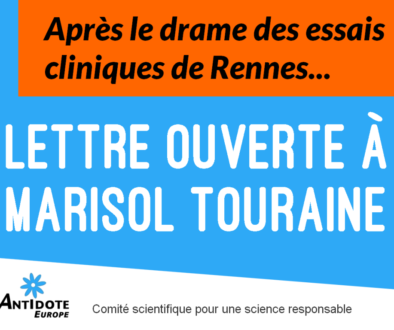Belgian Senate attentive to scientific toxicology
After adopting a “motion for a resolution” aiming at the creation of a toxicogenomics center, the Social Affairs Committee of the Belgian Senate organised a hearing on alternative methods to animal experimentation.
Last Wednesday the Belgian Senate organised a hearing on alternative methods to animal experimentation to which it invited two representatives of animal defence associations (ANSPA and Eurogroup for Animal Welfare) and one representative of the chemical industry, together with Claude Reiss, President of the Antidote Europe scientific committee, a molecular biologist who has developed a new approach to toxicogenomics.
This method, which is a reliable means of revealing the toxicity of chemical substances for human beings, has been encouraged by the European REACH regulations and, in a more concrete manner, has just been the subject of a “motion for a resolution” adopted by the Social Affairs Committee of the Belgian Senate on 29th November last. This was the context for yesterday’s hearing. As a first stage, the Belgian Senate is considering calling for a feasibility study for a toxicogenomics centre.
More than a million Europeans die prematurely (before the age of 65) each year in the absence of effective preventive measures. According to WHO, cancer alone caused 1.7 million deaths in Europe in 2006 alone; its incidence progressed by almost 10% between 2004 and 2006! The role of chemical pollution in the emergence of cancers, neurological diseases and other serious illnesses no longer needs to be shown. A hundred thousand chemical substances are potentially present in our environment and it was initially proposed that REACH study the danger represented by each of them for our health and the environment in order to withdraw from the market those which were the most toxic or to define the conditions for their use.
However, it is impossible to ascertain the toxicity of these substances by the methods required by current regulations: first, because these methods make use of animal experiments and therefore do not produce results that are reliable for human beings and then because they are too expensive ($2 to 4 million per substance*) and take too long (3 to 4 years per substance*), and are thus not applicable on a large scale. Conversely, a toxicogenomics centre using the approach proposed by Antidote Europe would allow the 100,000 substances to be tested in two years at a total cost of €1.5 milliard.
Whereas Belgium is starting to move towards truly scientific toxicology, the Italian Government has included in its programme the need for the “progressive abolition of animal experiments” and a senior official of the European Commission has declared that tests on animals are “simply bad science”, France, Europe’s second chemical power, is keeping silent on the subject. Worse still, Mr. Chirac has joined Mr. Blair and Mr. Schroeder in demanding that REACH should not be too heavy a burden for the chemical industry. And human health? And scientific innovation?
France is thus squandering the competence that nevertheless exists on its territory. Indeed, Antidote Europe, which has its headquarters in Strasbourg, showed the pertinence and feasibility of toxicogenomic testing while this term was still practically unknown in Europe. Its team of researchers has developed a computerised platform capable of managing a series of robots to test hundreds of substances in parallel in a record time and at a derisory cost, thus allying scientific research pertinent for our health with industrial competitivity. So, how is it that in the 21st century the regulations still require tests dating back to the 19th century?
* Estimate by the United States National Toxicology Program, based on the study of 500 substances


